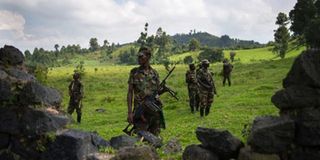Fleeing M23 rebels caught at Congo border, detained

M23 rebels during one of their operations. The Ugandan government announced Thursday that it has intercepted some 101 ex-M23 rebels, who were believed to be escaping back to their former hideouts in eastern Democratic Republic of Congo. AFP PHOTO
What you need to know:
- Congolese government spokesperson Lambert Mende told journalists in Kinshasa last Sunday that M23 rebels who have been in Uganda since 2013, after suffering defeat by the combined force of the UN and Congolese army, had made an incursion into Congo.
- Before their defeat four years ago, the M23 controlled huge swathes of land in eastern DRC.
KAMPALA. The Ugandan government announced on Thursday that it has intercepted some 101 ex-M23 rebels, who were believed to be escaping back to their former hideouts in eastern Democratic Republic of Congo. They have been at Makenke Barracks, the headquarters of the Uganda People’s Defence Forces (UPDF) 2nd Division headquarters.
The former rebels disguised as civilian passengers and were being trucked in four vehicles, Mr Ofwono Opondo, the executive director of Uganda Media Centre, the government communication clearing house, says in a statement.
The statement notes that the “rebels that have been cantoned at Bihanga Military Training School in Ibanda District [western Uganda] since the Agreement of 2014 have been quietly escaping into the general public and some to unknown places”.
They disguised themselves as ordinary passengers, but upon interrogation, detectives established that the men were members of M23 rebel group. The group in its heyday threatened to march on Kinshasa and depose President Joseph Kabila, but were pounded out of DRC by a UN-authorised multi-country counter-offensive force led by southern Africa countries. They have since stayed at Bihanga Military Training School, pending repatriation by the Congolese government upon fulfillment of terms of a truce pact negotiated two years ago.
“These were stealthily leaving their gazetted place of abode contrary to the Agreement of 2014 and the protocols signed with the DRC government,” Mr Opondo says in the Thursday statement.
The admission comes barely three days after the State Minister for International Relations, Mr Okello Oryem, urged Kinshasa to stop making “false allegations” that the rebels had crossed from Uganda and entered Congolese territory.
“We know there are problems in Kinshasa, but they [government] should not use Uganda as an excuse for their problems,” Mr Oryem said. President Joseph Kabila’s government at the height of the M23 fighting accused Rwanda and Uganda of supporting the belligerent group. Kigali and Kampala both flatly denied the accusation.
Congolese government spokesperson Lambert Mende told journalists in Kinshasa last Sunday that M23 rebels who have been in Uganda since 2013, after suffering defeat by the combined force of the UN and Congolese army, had made an incursion into Congo.
But Mr Oryem said the claims by the Kinshasa are intended to divert attention from increasing pressure on President Joseph Kabila who is trying to fend off mounting opposition over his decision to stay beyond his mandate which expired last month.
He also accused Kinshasa of reneging on its promise to repatriate more than 400 rebels who have been staying in Bihanga Barracks.
“President Kabila had assured us that they would organise and take them [M23] back but it’s taking forever,” the minister said.
Before their defeat four years ago, the M23 controlled huge swathes of land in eastern DRC.



